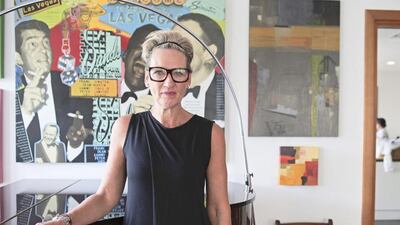After a career in public relations and marketing, Judith Hobby wanted a complete change of focus.
Believing the UAE’s women needed affordable yet stylish clothes that suited the sensibilities of the region and matched the stresses of the temperature, she began designing clothes.
While at first her mission was to help friends, she saw the business and demand grow, deciding to launch her online store judithhobbyclothing.com in 2011.
Ms Hobby, also a trained lawyer, says her fashion line is not haute couture, but rather are clothes with a purpose and a style not necessarily on offer in the shops and with a price tag that does not make your head spin.
“It wasn’t a conscious decision to create a business, it literally grew and grew without any intention,” she explains. “I am the designer, the manufacturer and the packer. I am the ultimate cottage industry, although out here it is a villa industry. I come up with the idea for a dress, top or shorts and run them up. I used to enjoy going to India or Bali with girlfriends to source material but now, as the business has grown, it’s generally the textile souq … I post them on the website and hope someone buys, which they usually do.”
Born and raised a Kiwi, Ms Hobby, 50, has spent eight years working in Bahrain and 15 years in Dubai.
Her home, while smack in the middle of suburban Dubai, on Arabian Ranches, still manages to have a metropolitan, bohemian vibe. A baby grand piano (hubby plays) snuggles next to three pugs. Signed Warhol, Calder and Haring prints fight for space on the walls alongside low, sloppy, seating.
While Ms Hobby runs her web business entirely alone, she says she is facing one of the problems that many independent retailers come up against in the UAE. Trading now for three years, her most popular garment the “Rachel ” shrug (a pullover that can be worn as a top or a dress) retailed for Dh200 and sold over 300 pieces. And while she has a regularly visited website, the chances of opening a physical retail space are small.
“The premium retail spaces in Dubai are all taken by the few family businesses that hold the licences for most of the global chains,” says Ms Hobby.
“Dubai has few urban spaces that small operators can build a niche in. It has little market space and less “pop-up” space, begging the question: how can a UAE-born independent retailer grow beyond its web based sales platform?” she asks.
“There are a few monthly markets in mall atriums to show locally produced products but you have to hope your customers are willing to eschew the normal retail path.”
Ms Hobby’s predicament is a common for the female entrepreneurial community of the Arabian Ranches, says Clementina Kongslund. As part of a marketing strategy for her children’s clothing website nordicfairyland.com, she set up a registry of the small and micro businesses in the villa community so people need not run off to a mall to buy kids clothes, cakes or any of the other products made by the 50 registered businesses.
“The Ranches is a hotbed of entrepreneurial activity so I set up www.ranchesbusinesswomen.com in 2011 so that residents could see what was available on their doorstep,” says Ms Kongslund. “There are a lot of grey areas that these micro-businesses have to work in because they cannot guarantee they will ever break even if they have to pay for a trading licence and an office space and whatever other fees can be levied against small business. Many are scared of advertising in case it is used against their husband’s visa or some other bureaucracy.”
While Judith Hobby’s business is fully licensed, one micro business owner, Suzanne, who does not want to reveal her full name, says her home-made confectionery business can only survive at the pop-up markets in Dubai’s Times Square and Ras Al Khaimah’s Al Hamra Mall and in the grey market with private commissions.
"I have five, five-star hotels that want to offer my fudge but because I don't have a trade licence it's not possible. It's not worth the Dh20,000-plus that is required to set up an SME licence here. In my best weekend, which is the weekend before Christmas, I will only take home Dh5,000 and that isn't profit, it's turnover after a huge amount of hours cooking at home by myself," says Suzanne. "There needs to be some sort of regulation which allows me to use my talents and keep money flowing through our house, but not be an entrepreneur that needs legitimising and regulating. I will pay a functional fee, but it has to be reasonable."
For Ms Hobby, however, she prefers a healthy work-life balance over expansion.
“I should be careful what I wish for,” she says.
ascott@thenational.ae
Follow us on Twitter @Ind_Insights


